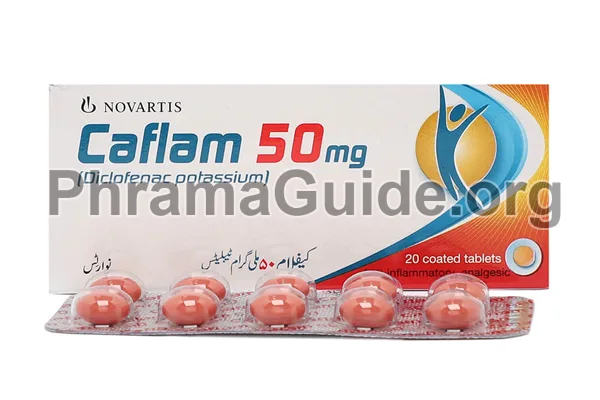Caflam tablet is a nonsteroidal anti-inflammatory drug that is used to treat pain and inflammation. It relieves pain caused by a variety of conditions including muscle pain or stiffness, and joint pain. Following are some common and off-label uses of Caflam tablets:
Common Uses of Caflam Tablet
- Osteoarthritis: Caflam tablet is used to treat osteoarthritis, a condition in which the cartilage and bones in the joints break down over time, causing pain, stiffness, and inflammation.
- Rheumatoid Arthritis: Caflam tablet is used to treat rheumatoid arthritis, a chronic autoimmune disorder that causes inflammation in the joints.
- Ankylosing Spondylitis: Caflam tablet is used to treat ankylosing spondylitis, a type of arthritis that primarily affects the spine.
- Acute Pain: Caflam tablets may also be used for the short-term treatment of acute pain caused by conditions such as dental pain, menstrual cramps, and musculoskeletal injuries.
- Migraine: Caflam tablets may also be used in the treatment of acute migraine attacks.
- Dysmenorrhea: Caflam tablet is also indicated for the relief of pain associated with menstrual cramps.
- Postoperative Pain: Caflam tablets may be used to relieve pain following surgery.
- Acute Gout: Caflam tablets may be used to treat the pain and inflammation associated with acute gout.
Off-label Uses of Caflam Tablet
- Menstrual Migraines: In some cases, Caflam tablets may be used off-label for the treatment of migraines associated with menstruation.
- Bursitis and Tendinitis: Caflam tablet may be used off-label to reduce inflammation and pain associated with bursitis and tendinitis.
- Dental Pain: Caflam tablet may be used off-label for the relief of dental pain, particularly after dental procedures or surgeries.

What is Caflam?
Caflam is one of the leading brands of Diclofenac Potassium, manufactured and marketed by Novartis Pakistan.
Caflam Alternatives : Other Similar Brands
Following are some alternative brands of Caflam and their manufacturers.
- Maxit : Hilton Pharmaceuticals (Pvt) Ltd, Pakistan.
- Beflam : Batala Pharmaceuticals Pakistan.
- Diclorep : Sami Pharmaceuticals (Pvt) Ltd, Pakistan.
- Detran P : Sunshine Pharmaceuticals (Pvt.) Ltd, Pakistan.
- Diclo P : Indus Pharmaceuticals (Pvt) Ltd, Pakistan.
- Sofac-P : Saffron Pharmaceuticals (Pvt) Ltd, Pakistan.
- Voltaflam : Platinum Pharmaceuticals (Pvt) Ltd, Pakistan.
- Artimov-K : Barrett Hodgson Pakistan (Pvt) Ltd.
- Artinil K : Global Pharmaceuticals, Pakistan.
- Klic-F : Tabros Pharma Pakistan.
- Catafen : Cibex (Pvt) Ltd, Pakistan.
Caflam : Available Formulations and Strengths
Presently, Caflam is available in Tablet form.
Caflam Tablet : 50mg Strength
Who Should Not Use Caflam?
As with any medication, there are certain contraindications associated with the Caflam tablets.
- These include hypersensitivity reactions to diclofenac (an active ingredient of Caflam) or aspirin-like drugs (such as ibuprofen).
- People who have active peptic ulcer disease, or a history of peptic ulcer disease within one year prior to starting therapy with Caflam tablets, recent gastrointestinal bleeding or perforation known to have been caused by NSAIDs including Caflam tablets.
- People who are suffering from congestive heart failure that has worsened during treatment with an NSAID including Caflam tablets.
- People who are suffering from a hepatic disease that has developed during treatment with an NSAID including Caflam tablets.
- People who are suffering from severe renal impairment (creatinine clearance <30 mL/min)
- Pregnancy at term (≥37 weeks gestation) third trimester of pregnancy due to risk for premature closure of fetal ductus arteriosus leading to pulmonary hypertension in the newborn infant when given after 30 weeks gestation.
- In addition, caution should be exercised when using Caflam if you have any other medical condition including high blood pressure, heart failure, diabetes mellitus, asthma, kidney problems, liver problems, bleeding disorders, low sodium levels in your blood (hyponatremia), edema (swelling), hearing loss due to fluid retention in the inner ear spaces due to long-term use over several months/years because it can affect your ability balance. It is important that you discuss these potential risks associated with taking this medication prior to commencing treatment.
What is the Recommended Daily Dosage of Caflam?
Caflam Tablet’s daily dose is 50mg tablet two or three times a day (Depending on the pain severity).
Caflam Tablet is recommended to take with or after the meal to avoid gastrointestinal problems.
How Caflam Works?
Caflam Tablet works as an inhibition of prostaglandin synthesis by inhibiting cyclooxygenase (Enzyms). The formation of prostaglandins is responsible for pain and inflammation in the body.
Related Links:

Leave A Comment